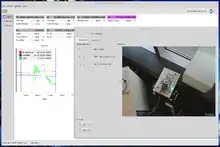Eclipse NeoSCADA
Eclipse NeoSCADA (formerly Eclipse SCADA) is an Eclipse Incubator project created in July 2013, that aims at providing a full state-of-the-art, open-source SCADA system that can be used out of the box or as a platform for creating a custom solution. Eclipse SCADA emerged from the openSCADA project,[2] which now provides additional functionality on top of Eclipse SCADA.[3]
 | |
| Developer(s) | Eclipse Foundation |
|---|---|
| Stable release | 0.4.0
/ February 15, 2017[1] |
| Preview release | 0.5.0
/ June 6, 2018[1] |
| Written in | Java |
| Operating system | Cross-platform |
| Platform | Java platform |
| Type | SCADA |
| License | Eclipse Public License |
| Website | eclipse |
The initial release (0.1.0) is based on the source code of openSCADA 1.2.0 and has been focusing on the relocation of the project to the Eclipse Foundation, like changing package names and namespaces.[4]
The Eclipse NeoSCADA project is part of the Eclipse IoT Industry Working Group initiative.[5]
As of August 28, 2014 Eclipse SCADA is filed under the Eclipse IoT top level project.[6][7]
Supported protocols
The following protocols are directly supported by Eclipse NeoSCADA:[8]
- Command Line Applications
- JDBC
- Modbus TCP and RTU
- Simatic S7 PLC
Other protocols can be implemented by writing driver modules using the Eclipse SCADA API. There are a few driver modules currently available outside of Eclipse SCADA:[8]
References
- "Eclipse NeoSCADA™ – News". eclipse.org. Retrieved 2021-04-04.
- "Eclipse SCADA Project Proposal". 28 May 2013. Retrieved 22 July 2014.
- openSCADA goes Eclipse!, What does it mean for openSCADA?
- Eclipse SCADA im Fokus: Das Framework für Heimautomatisierung und Anlagen-Steuerung, (German), July 16, 2013. Retrieved July 22, 2014.
- "iot.eclipse.org – Ecosystem". Archived from the original on 2014-07-14. Retrieved 2014-07-22.
- Internet der Dinge: Eine strategische Aufgabe bei Eclipse, (German), August 29, 2014. Retrieved August 29, 2014.
- "[move] transfer SCADA project to top-level IoT project". 28 August 2014. Retrieved 29 August 2014.
- "Supported Protocols". 30 April 2014. Retrieved 27 August 2014.